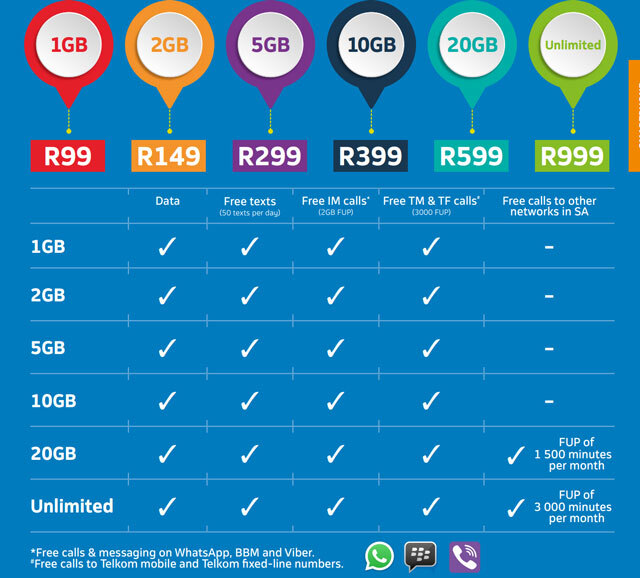Brace yourself. The most exciting thing being done in the South African cellular industry right now is by …. Telkom.
Last week the fixed line behemoth – which mobile network operators in years past managed to usurp for voice calls and wireless broadband by offering more flexibility – turned the tables on these now dominant networks with its own aggressively cheaper deals.
Telkom Mobile launched an aggressive range of new products, focussed on data – instead of voice – that should be giving the other networks sleepless nights. Called FreeMe, the packages start at 1GB for R99, and reach up to R999 for unlimited voice, data and SMSes. The clincher is that all packages offer free messaging and voice-over-internet-protocol (VoIP) calls via the popular WhatsApp, BlackBerry Messenger and Viber apps. Deals with Skype and FaceTime are on the way. The prices are the same for prepaid and contract customers.

It’s a welcome relief. Cellphone packages and the confusing way bundles are constructed have been the bane of the cellular user for the past two decades. There always seems to be a hidden catch; and weary consumers can rightfully feel that, like gambling, the house always wins.
But Telkom, the former landline monopolist, is uncharacteristically the underdog in mobile – a bit like Microsoft is in search and mobile. Telkom Mobile is now a distant fourth in the mobile space, behind Vodacom’s 37.7%, MTN’s 36% and Cell C’s 23% with only about 2.6%, according to Research ICT Africa.
Therefore, with its vast resources and abundance of spectrum, Telkom is able to use its economies of scale to offer these great deals. Telkom’s Attila Vitai, CEO of its consumer and small business division, says this is possible because Telkom is converting its 1,8GHz spectrum from old 2G voice calls to provide 4G/LTE data services. The industry calls this “refarming” and it shows just how valuable these previously under-utilised frequencies are.
Meanwhile, VoIP calling has gone through various cycles of efficiency and its now mostly on a par with the old traditional switched voice networks. I’ve been using them for years for staying in touch with friends overseas, or calling back home when I travel internationally. Call quality through Skype, FaceTime, WhatsApp and WeChat is as good as plain old voice, I’ve found; and I’ve noticed how many people prefer these data channels when calling me, even in South Africa. It makes perfect sense: why pay for an expensive voice call when a VoIP call is just as good and free?
Telkom Mobile – through a funny set of adverts overseen by its chief marketing officer Enzo Scarcella, who has held the same position at Vodacom – has highlighted a few of the problems with bundled offerings, including the bizarre bill for itemised billing; essentially a bill for a bill.
Another clincher is that Telkom has 6,000 WiFi hotspots around the country that are also free for its mobile customers to use. It offers free so-called on-network calls to other Telkom Mobile or landline numbers – a staple of US calling plans for years – and “fair usage” voice minutes for its top-end 20GB (R599/month) and unlimited R999/month packages. With such data packages and the zero-rating of VoIP calls through these popular over-the-top (OTT) apps, a Telkom Mobile subscriber could conceivably never need to pay for voice calls again.
I’m not expected a rush of “me-too” packages from the other networks immediately. Quite prudently, they are likely to wait and see how much churn these FreeMe packages create for existing customers.
Telkom Mobile has confounded its critics with these aggressive, data-centric packages. Let’s see how the mobile market reactions to the simplification and Telkom’s new role as the disruptive underdog.
This column first appeared on Financial Mail